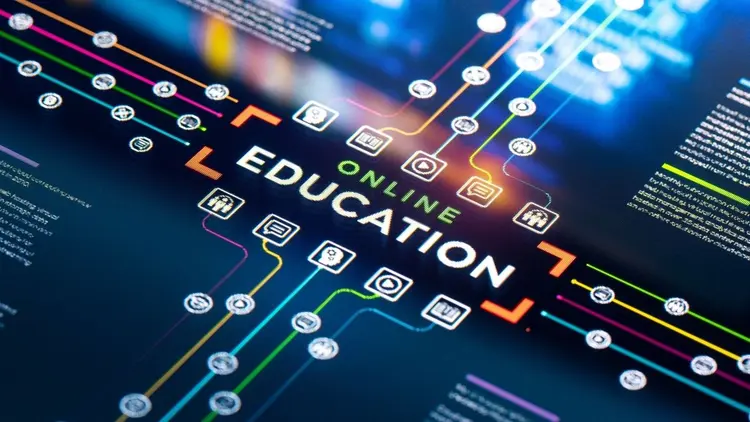

In an era where digital transformation has reshaped every facet of our lives, education has not been left untouched. The burning question on many minds is: “Do universities accept online courses?” Yes, they do! The acceptance and integration of online courses and degree programs into the academic mainstream mark a significant shift in educational paradigms. Let’s dive deep into the world of online education, exploring how it’s reshaping the future of higher education in a way that’s both engaging and informative.

The skepticism once shadowing online education has significantly diminished. Today, countless universities and colleges globally have woven online education into their fabric, offering a myriad of online degree programs. The allure of completing a degree online caters to everyone from undergraduate students to adult learners, showcasing the flexibility, diversity, and accessibility online programs offer.
Quality and rigorous standards set by accredited institutions have played a pivotal role in the acceptance of online education. Whether aiming for a bachelor’s degree or master’s, the accreditation of the online program is crucial, ensuring it meets the high standards of quality education.

In the rapidly evolving world of higher education, the lines between traditional and digital learning environments continue to blur. As online education gains prominence, a question that frequently surfaces among prospective students is how universities perceive online courses during the admissions process.
Specifically, do these digital credentials bolster a student’s chances of being accepted into a university for higher education courses? Let’s delve into this topic, utilizing a plethora of relevant keywords to shed light on the current landscape.
Many universities now recognize the value and legitimacy of online classes, especially those offered by accredited schools. The acceptance of online degrees and coursework as part of a student’s academic portfolio is increasingly becoming part of universities’ admissions policies. This shift reflects a broader understanding that online education can provide a quality education, often equivalent to in-person instruction.
The crux of the matter lies in accreditation. Universities are more likely to consider online college work favorably if it originates from an institution with regional accreditation. Regional accreditation is a hallmark of quality and rigor, assuring universities that the online course or program meets stringent academic standards. This reassurance is crucial in the admissions process, as it aligns with the commitment to uphold educational excellence.
As online education becomes more mainstream, universities are adapting their admissions policies to reflect this shift. The vast majority of institutions now offer online courses themselves, acknowledging the legitimacy and potential of digital learning platforms. This mutual recognition between online and traditional education systems has paved the way for a more inclusive approach to evaluating applicants’ qualifications.
The #1 to make money online with TikTok Search (FREE TRAINING)

Online classes enable students to showcase their commitment to furthering their education, their ability to complete coursework independently, and their time management skills. These qualities are highly regarded in the admissions process.
Furthermore, the collaborative nature of many online courses, which often require students to complete group work assignments and book online conference rooms for discussions, demonstrates a student’s ability to engage with fellow students and work effectively in teams.
The availability of federal financial aid for online students also plays a role in the growing acceptance of online education. Financial aid eligibility for online courses signifies that the program meets certain educational standards and is thus recognized by the federal government. This recognition further legitimizes online education in the eyes of both students and universities.
When considering applications, universities look at a variety of factors, including but not limited to, academic achievements, test scores, and extracurricular activities. Online courses and degrees add another dimension to this evaluation, offering insight into a student’s interests, academic rigor, and adaptability to different learning environments.
For programs in fields like data science and political science, which are increasingly offered online, completion of relevant online coursework can be particularly persuasive.

As the educational landscape continues to evolve, the integration of online education into university admissions policies is expected to deepen. The direct access to a wide array of courses, the ability to engage with diverse learning materials through learning management systems, and the opportunity to connect with other students globally are aspects of online learning that align well with the goals of higher education.
Universities are increasingly recognizing and valuing online courses as a vital component of the admissions process. The key to ensuring that online college work strengthens an application lies in choosing courses from accredited schools known for their quality and rigor.
As the distinction between online and traditional education continues to fade, the opportunities for students to leverage online learning as a stepping stone into higher education will only grow. With this trend, the future of university admissions looks set to further embrace the diversity and flexibility that online education brings to the academic world.

The integration of online courses by reputable universities, like the State University of New York (SUNY), has revolutionized the education landscape. Offering online courses across various disciplines, these institutions ensure the quality of education provided online mirrors that of in-person classes.
The flexibility of online education allows students to engage with course material, participate in group assignments, and attend classes from anywhere globally, breaking traditional barriers to education.
Accreditation emerges as the critical factor for the widespread acceptance of online courses by universities. Recognized accredited online colleges uphold education standards akin to those of traditional in-person education, with regional and national accreditation being pivotal markers for quality.
An online degree’s value also hinges on the institution’s reputation and the faculty’s credentials, ensuring a rich and challenging learning experience. Universities offering online programs invest in qualified faculty and enriching course content, paralleling their on-campus offerings.
Moreover, online education facilitates access to extensive student support services, enhancing the learning experience. Online students can even book online conference rooms, collaborating on assignments and engaging in real-time discussions, fostering a collaborative learning environment akin to in-person classes.

The affordability of education is a pivotal issue for countless students aspiring to advance their academic and professional pursuits. In the digital age, where online classes and degree programs have become mainstream, understanding the financial aid landscape for online education is crucial.
Federal financial aid, a cornerstone of support for students, extends its reach to those enrolled in accredited online degree programs, thereby broadening the pathway to higher education for a diverse student body.
At the heart of the financial aid eligibility criteria for online courses is accreditation. Not all online schools are created equal, and the distinction between regionally accredited institutions and for-profit schools can significantly impact the availability of federal financial aid.
Regionally accredited institutions, recognized for their adherence to rigorous standards set by higher education accreditation bodies, are generally eligible for federal aid programs. This accreditation assures that the online environment mirrors the quality and integrity of traditional on-campus programs, making students of these courses eligible for financial assistance.
Federal financial aid for online students covers an extensive range of educational expenses, from tuition fees to textbooks and other essential learning materials. This broad coverage is vital in making education more accessible, particularly for learners who may otherwise be deterred by the prospect of high student debt. For students completing an online class or pursuing a degree entirely online, access to federal financial aid can be the deciding factor in their ability to continue their education.
It’s essential for students to recognize the differences between for-profit schools and non-profit online institutions, especially regarding financial aid. For-profit schools often offer online degrees but may not always carry the same level of accreditation as their non-profit counterparts.
This difference can affect not only eligibility for federal financial aid but also the perception of the degree in the job market. Students should conduct thorough research to ensure their chosen online school is regionally accredited and recognized by federal financial aid programs.
One of the most compelling advantages of online education, when paired with federal financial aid, is its potential to reduce the overall burden of student debt. By choosing accredited online programs eligible for financial aid, students can significantly lower their education costs.
Moreover, the flexibility of online classes allows many students to work while they study, further mitigating the necessity to take on substantial loans.

While discussing financial aid and online education, it’s also worth noting the role of standardized test scores. Although not directly related to financial aid eligibility, these scores are often part of the admissions process for both traditional and online higher education programs.
However, the growing trend of test-optional policies, especially among online programs, reflects a shifting focus towards a more holistic review of applicants. This shift can level the playing field for students from diverse backgrounds, including those who may have completed their high school education online.
The landscape of financial aid for online courses is a beacon of hope for students seeking to navigate the financial challenges of higher education. By focusing on accredited online degree programs, learners can unlock federal financial aid opportunities, making their educational and professional aspirations more attainable.
As online education continues to grow, the support structures surrounding it, including financial aid, are evolving to ensure that a wider array of students can access and benefit from this flexible and dynamic learning environment.

The perception of online learning as an isolated journey is a myth that has been thoroughly debunked in recent years. Far from being a solitary path, online education has proven to foster a dynamic and interactive social environment.
This transformation is largely attributed to the innovative use of learning management systems (LMS), which serve as the backbone of the virtual classroom, facilitating a rich tapestry of social interaction among students enrolled in online degree programs.
Learning management systems are more than just platforms for accessing course materials; they are vibrant online communities where students and instructors converge. Through discussion forums, live chat features, and video conferencing tools, LMS platforms enable real-time interaction that can rival, and sometimes exceed, the level of engagement found in traditional classroom settings.
These platforms empower students to share insights, pose questions, and collaborate on projects, thereby enhancing the learning experience and fostering a sense of camaraderie.
The notion that online education lacks social interaction overlooks the reality of how accredited schools have leveraged technology to build learning communities. When students enroll in an online degree program, they are not just accessing course content; they are joining a network of peers from diverse backgrounds and locations. This network becomes a space for exchanging ideas, providing support, and building professional connections that often extend beyond graduation.
One of the hallmarks of a quality online education is the emphasis on collaborative learning. Through group work assignments and peer-review sessions facilitated by the LMS, students learn to navigate teamwork in an online environment.
This collaborative approach not only mirrors the dynamics of the modern workplace but also allows students to develop critical soft skills such as communication, leadership, and problem-solving.
The #1 to make money online with TikTok Search (FREE TRAINING)

Behind every successful online degree program is an accredited school committed to delivering a quality education. Accreditation plays a crucial role in ensuring that online programs meet stringent academic standards, which includes providing a learning environment that supports social interaction and community building.
Accredited institutions invest in a robust Learning Management System and design their online courses to encourage active participation, ensuring that students gain both the knowledge and the interpersonal experiences they need for success.
The enriched social dimension of online learning has a significant impact on students’ decisions to enroll in an online degree program. Prospective students are increasingly recognizing the value of an online education that offers not only flexibility and accessibility but also the opportunity to be part of a vibrant learning community. This aspect of online learning is particularly appealing to those who seek a balance between their academic, professional, and personal lives.
The social dimension of online learning is a testament to how far online education has come in breaking down the barriers of isolation. Through the strategic use of learning management systems, accredited schools have created engaging and interactive online environments that rival traditional classrooms. As more students enroll in online degree programs, the social fabric of online education continues to evolve, proving that learning online can be a deeply connected, communal experience.

As we gaze into the future of education, the trajectory of online learning not only trends upwards but promises to redefine the educational landscape. This evolution is propelled by continual advancements in technology, which have enhanced the quality and accessibility of online education. A pivotal factor in this forward momentum is the growing acceptance of online degrees by employers across various industries. This recognition signals a significant shift in perceptions, affirming the value and legitimacy of online credentials.
The acceptance of online degrees by the workforce is a cornerstone in the evolution of digital learning. As more employers recognize the rigor and quality of online education, graduates of online programs find their degrees holding equal weight to those earned through traditional on-campus paths. This shift is not just a win for online learners but also for employers who gain access to a broader pool of skilled and diverse candidates. The acceptance of online degrees underscores the fact that the knowledge and competencies acquired through online learning meet, and often exceed, the demands of the modern workplace.
The future of online education is inextricably linked to technological innovation. Cutting-edge tools and platforms are continually being developed, enhancing the interactivity and engagement of online courses. Virtual reality (VR), augmented reality (AR), and artificial intelligence (AI) are just a few of the technologies that are starting to play a role in creating immersive learning experiences. These technologies enable students to explore complex concepts in a hands-on manner, bridging the gap between theoretical knowledge and practical application.
Central to the advancement of online education is the commitment to creating student-centric online environments. This approach prioritizes the needs and preferences of students, ensuring that online courses offer flexibility, accessibility, and a level of engagement that matches or surpasses traditional classroom settings.
Personalized learning paths, adaptive learning technologies, and robust support systems are integral to these environments, catering to the diverse learning styles and life circumstances of online students.
As online education continues to expand, the role of accreditation in ensuring the quality of online programs remains crucial. Accredited online degrees are a testament to the rigorous standards met by educational institutions in delivering their online curricula.
This accreditation is a key factor for employers who accept online degrees, as it guarantees that students have received an education that meets the high standards required in their respective fields.
Looking ahead, the landscape of online education is set to offer unprecedented opportunities for learners worldwide. The acceptance of online degrees by employers, coupled with ongoing technological advancements, is making online education a compelling and viable option for many.
As online learning environments become more interactive and student-centered, the potential for students to thrive and succeed in their professional and personal endeavors is limitless. The future of online education is not just about maintaining parity with traditional learning but about setting new benchmarks for excellence and innovation in the digital age.

The integration of online courses by universities worldwide has opened doors for students globally, making quality education more accessible and flexible. Accredited institutions offering dynamic online programs are a testament to the evolving landscape of higher education.
For those embarking on the journey of online education, the path is illuminated. Opt for accredited programs, leverage the resources and support services available, and embrace the opportunities that online learning presents.
The realm of online education is ever-expanding, with resources like Teach.io offering further insights into the benefits and possibilities of online learning. The journey is just beginning, and the potential of online education is boundless.





